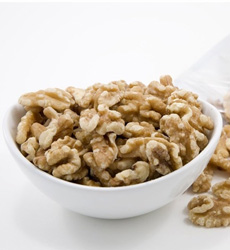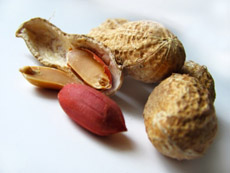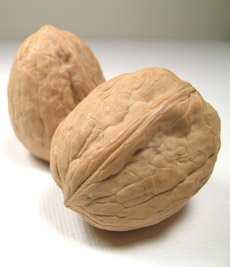 Several nuts are heart-healthy; but for omega-3s, walnuts are the healthiest of all. Photo courtesy Superior Nut Company. Several nuts are heart-healthy; but for omega-3s, walnuts are the healthiest of all. Photo courtesy Superior Nut Company.
|
KAREN HOCHMAN is Editorial Director of THE NIBBLE.
|
|
January 2011
Last Updated April 2011
|
 |
Product Reviews / Main Nibbles / Fruits & Nuts
Enjoy More Healthy Nuts
Often Thought Of As “Fattening,” Several Varieties Of Nuts Offer Significant Health Benefits
CAPSULE REPORT: This is page one of a two-page article about healthy nuts. Click on the black link below to visit Page 2.
Overview: The Magnificent Seven Healthy Nuts
Nuts are a good protein food. Yes, they have fats, but largely unsaturated, heart-healthy fats which have been shown to lower LDL cholesterol. Researchers have found that people who eat nuts regularly have lower risks of heart disease.*
*See the 1996, the Iowa Women's Healthy Study, the Harvard School of Public Health study and the 2002, the Physician's Health Study.
That makes nuts a heart-healthy food. In 2003, the FDA approved the following claim for seven different types of nuts, which contain less than 4g of saturated fats per 50g:
| |
“Scientific evidence suggests but does not prove that eating 1.5 oz per day of most nuts as part of a diet low in saturated fat and cholesterol may reduce the risk of heart disease.” |
|
The “Magnificent Seven” of nuts include:
- Almonds
- Hazelnuts
- Peanuts
- Pecans
- Pine nuts
- Pistachios
- Walnuts
|
|

Peanuts. Photo by Michaela Kobyakov | SXC. |
These varieties of nut contain less than 4g of saturated fats per 50g. If certain favorites aren’t on the list—for example, macadamia nuts—it’s because they’re higher in saturated fat (the bad fat).
The Magnificent Seven contain heart health benefits, including:
- Fiber, part of all nuts, which helps to lower cholesterol and may play a role in preventing diabetes.
- L-arginine, which an amino acid that may make artery walls more flexible and thus less prone to blood clots that can create heart attacks.
- Omega-3 fatty acids, which, among other heart benefits, prevent dangerous heart rhythms that can lead to heart attacks.
- Plant sterols, which help to lower cholesterol.
- Unsaturated fats, which are believed to lower cholesterol levels.
- Vitamin E, which may help stop the development of plaques in your arteries and prevent coronary artery disease or a heart attack.
Of course, you can have other types of nuts. You’ll just get less monounsaturated (good) fat and more saturated (bad) fat.
No matter which nuts you choose, the key is to limit your intake to one to two ounces of unsalted nuts per day. Measure at home and learn what an ounce of peanuts looks like. Emptying the peanut bowl may deliver lots of protein, but at a calorie count that is not “healthy eating.”
Why Walnuts Might Be The “Healthiest” Nuts
In today’s omega-3-obsessed food culture, walnuts have a significantly higher amount of alpha linolenic acid as compared to other nuts.
Alpha linolenic acid is a type of plant-derived omega-3 fatty acid. It’s similar to the omega 3 found in salmon, which many studies show lowers total cholesterol and LDL cholesterol (the bad cholesterol) levels.
While walnuts contain higher levels of omega-3s than other nuts, each variety brings something to the table. For example:
- Almonds have higher amounts of vitamin E.
- Pistachios contain the most iron.
- Peanuts contain the most protein of any nut and are also packed with energizing B vitamins.
|
|

Walnuts. Photo by J. Eltovski | Morguefile. |
And almost all nuts have the same total nutritional levels. As a food group, nuts are one of the best sources of plant protein. They also deliver valuable fiber, phytonutrients and antioxidants such as selenium and vitamin E.
Continue To Page 2: Serving Suggestions For Healthy Nuts
|




